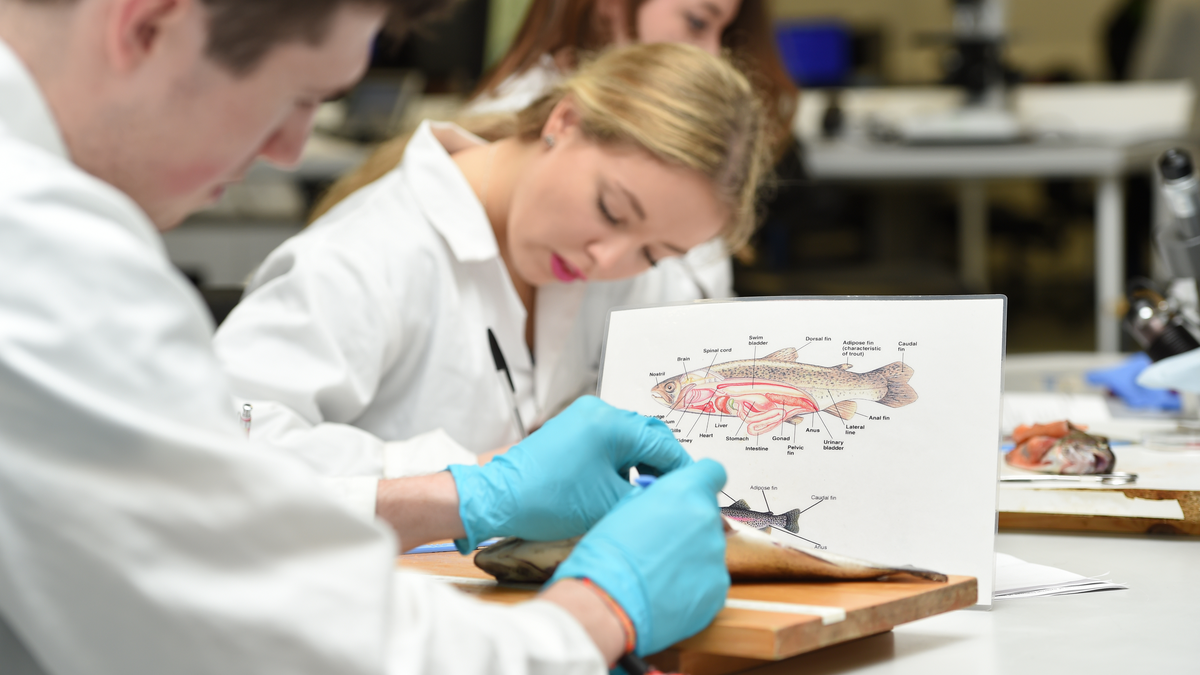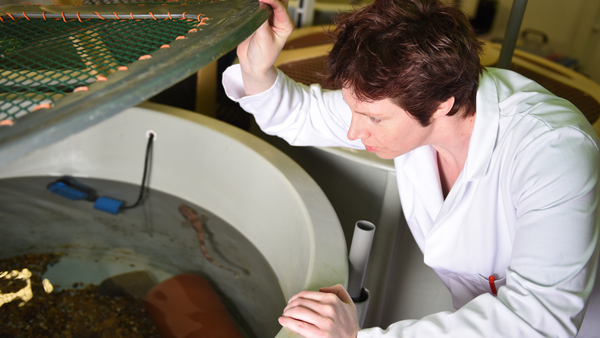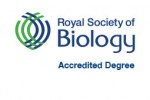Introduction
Our programme focuses on both the molecular and organismal aspects of biology, bringing together practical lab and field based teaching with cell biology, genetics, evolutionary genomics, ecology and physiology. You will have the opportunity to specialise in your area of interest, choosing a focus in animal, plant or environmental science.
Study Information
At a Glance
- Learning Mode
- On Campus Learning
- Degree Qualification
- BSc
- Duration
- 48 months
- Study Mode
- Full Time
- Start Month
- September
- Location of Study
- Aberdeen
- UCAS Code
- C901
- Pathway Programme Available
- Undergraduate Foundation Programme

Studying Biological Sciences helps you develop a broad understanding of the nature of living things, from molecules and cells, organisms and populations, to communities and biomes.
Your courses will give you an excellent foundation in the theory and practical elements behind the study of life and provide you with the technical skills to pursue your own interests through your project work.
What You'll Study
- Year 1
-
Compulsory Courses
- Getting Started at the University of Aberdeen (PD1002)
-
This course, which is prescribed for level 1 undergraduate students (and articulating students who are in their first year at the University), is studied entirely online, takes approximately 5-6 hours to complete and can be taken in one sitting, or spread across a number of weeks.
Topics include orientation overview, equality and diversity, health, safety and cyber security and how to make the most of your time at university in relation to careers and employability.
Successful completion of this course will be recorded on your Enhanced Transcript as ‘Achieved’.
- Frontiers in Biological Sciences (BI1009)
-
15 Credit Points
Five themes, critical to understanding biology and life, will be explored – Developmental Biology, Microbiology and Disease, Evolution and Behaviour, Immune Systems and Environmental Physiology. Each theme is structured to provide you with core knowledge, insight into how science is practiced, an introduction to current research topics and skills that are useful for investigating, recording and analysing information. The course will be delivered using a blended learning approach and can be taken by students who will be on campus in first semester, or those who may choose to stay at home
- Diversity of Life 1 (BI1012)
-
15 Credit Points
A walk through the evolutionary tree of life, examining the amazing diversity of major groups of organisms from plants through fungi to early invertebrates. Learn about how each group of organisms arose, their characteristics, and how they achieved success. Practical activities provide hands on experience of materials demonstrating the diversity of plants and invertebrates.
- Ecology and Environmental Science (BI1511)
-
15 Credit Points
This course begins with study of the physical workings of the Earth and the interactions between living organisms and their environments. We then look at the effects humans are having on the planet, potential solutions to global problems and thoughts on the future.
Teaching is by staff with different subject specialisms who give both variety and immediacy to course material.
Exposure to the problems we are facing both now and in the future will help you make informed choices in your everyday life.
A range of ‘wet’ and computer-based practicals enhance the classroom teaching and develop generic scientific skills.
- Diversity of Life 2 (BI1512)
-
15 Credit Points
- A walk through the evolutionary tree of life, examining the amazing diversity of advanced invertebrates and vertebrates.
- Learn about how each group of organisms arose, their characteristics, and how they achieved success. For example what are the key evolutionary steps enabling life away from the water? How do birds fly?
- Practical activities provide hands on experience of materials demonstrating the features of invertebrates, amphibians, fish, birds and mammals.
- The Cell (SM1501)
-
15 Credit Points
• Cells are the fundamental unit of life – without them life could not exist, and as such understanding how they function is crucial to our understanding of biology and medical science.• This course provides theoretical knowledge in a diverse range of topics covering the fascinating world of cells, from molecules like DNA, to how different cell types function within our bodies.• All practical classes are research based and will provide theoretical knowledge and skills training in many areas of molecular and cell biology.• Employability skills will also be explored through a highly interactive enterprise session and our online mini course.
- Chemistry for the Life Sciences 1 (CM1020)
-
15 Credit Points
This course covers the foundations of chemistry that underpin the life sciences at a molecular level and is suitable for students with different backgrounds including little or no previous study of chemistry. The basic concepts of quantitative chemistry will be covered, along with the different types of organic molecules, acids and bases, and the principles of kinetics and thermodynamics. The relevance of the course materials to life science is emphasised throughout.
Laboratory classes introduce important practical techniques, with experiments that reinforce and complement the taught material.
The course will allow students to continue with other chemistry courses as part of their enhanced study by providing discipline breadth.
Optional Courses
Plus 30 credit points from courses of choice
- Year 2
-
Compulsory Courses
- Biological Enhanced Skills Training (BEST) (BI2018)
-
15 Credit Points
The course will help you develop or consolidate skills in experimental design, sampling, analysis, presentation, and interpretation of data.
Each week, there are one 1-2 recorded introductory lectures to help you prepare for the computer practicals. In two 2-hour sessions per week you will work through a series of computer-based data tasks, using relevant and realistic biological and environmental themes. The course will introduce you to different types of software which can be used to analyse data, including Excel, Minitab, and R studio.Teaching is informal and friendly. During sessions, staff will chat to you about your progress and provide help where necessary.
- Introduction to Genetics (BI2023)
-
15 Credit Points
Genetics and evolution are inextricably linked and provide the foundation for all other biological concepts. In this course we introduce the subject of genetics from an evolutionary perspective that is informed by genome analysis.A series of lectures and computer workshops will introduce you to the fundamental principles of evolution, genetics and molecular biology. In practical classes you will have opportunity to practise modern molecular techniques.You will also explore ethical dilemmas that arise as a consequence of our potential ability to manipulate genomes.
- Ecology (BI2020)
-
15 Credit Points
This course builds on themes from introductory ecology courses: effects of biodiversity, disturbance in natural communities, nutrient and energy cycles. herbivory, predation, competition, population dynamics, parasitism, mutualisms and foodwebs. You will develop your abilities to interpret data by applying theory discussed in classes to real-life data sets using short problem-solving exercises linked to each topic. Feedback will help you improve writing and interpretation skills. Extended problem-solving exercises will improve your communication skills, scientific writing and introduce you to valuable approaches to summarising complex datasets in Excel. You will also consider issues around experimental design.
- Comparative Physiology 1 (BI2524)
-
15 Credit Points
Do you know how your body functions? The body is analogous to a complex machine that depends on appropriate functioning of all of parts. Physiology is the study of how the parts work and interact with other parts to support the normal functioning of the organism.
This course introduces the basics of animal physiology, highlighting similarities and differences in animals across the tree of life.
Lectures provide theoretical understanding of the processes that underpin the functioning of and communication between cells, tissues and organs.
Practicals allow you to apply concepts and develop lab skills.
Through the study of examples from across different phyla, you gain an appreciation of processes fundamental to all animals, and of differences across groups.
The assessments give you the opportunity to consolidate your learning, explore a topic of interest in more depth and develop transferrable skills.
- Plants, People, and the Environment (BI25P4)
-
15 Credit Points
A course in which students explore both core and emerging issues in the plant sciences, focusing in particular on the inter-dependence of plants, people and environment. Students are encouraged to develop a range of important generic and applied skills, through lectures, practicals and seminars. One practical and two seminars contribute 60% of the course mark. An online assessment contributes 40% of the overall course grade and consists of short, structured questions.
Optional Courses
Plus 30 credit points from courses of choice.
Plus one of the following field courses:
- BI25FA - Field Skills in Ecology and Animal Behaviour
- BI25FB - The Living Landscape
- Coastal Biodiversity (BI25F2)
-
15 Credit Points
This is a residential field course that uses the University of Aberdeen Lighthouse Field Station up in Cromarty to introduce a range of terrestrial, coastal and marine habitats, and the techniques that are being used to study and manage the diverse species in these ecosystems.
The field course provides an insight into how scientific research and long-term monitoring underpins our understanding and management of biodiversity, and the different organisations responsible for stewardship and conservation across the UK. The course explores how natural and anthropogenic environmental change can influence different coastal ecosystems, and the challenges of managing those ecosystems where there are a range of practitioners, stake-holders and end-users with different and potential conflicting priorities.
Importantly, the course provides “real world” experience of ecological fieldwork, with a focus on how to design, plan and safely execute monitoring programmes for a range of different species and habitats.
Dates for 2023/2024 are 12/05/2024 to 17/05/2024
- Field Biology (BI25F6)
-
15 Credit Points
During day trips from Aberdeen, you will learn and practice a variety of techniques for sampling and identifying organisms in the field.
We will take opportunities to interact with scientists from NGOs and research institutes, who will give instruction on techniques and provide overviews on the remits and opportunities within their organisations.
Group based project work provides skills in team working, data collection, analysis and presentation.
You will develop skills in biological recording by maintaining a detailed record of the field activities in a field notebook.
By visiting and working in a variety of environments you will become familiar with common species, the ecological characteristics of local habitats and have opportunities to apply your classroom learning to the field.
Dates for 2023/2024 are 20th May 2024 to 26th May 2024
- Marine Field Ecology (BI25F9)
-
15 Credit Points
This is a marine biological field course to the Millport Field Centre on the Isle of Cumbrae in the Firth of Clyde. The course introduces you to littoral and nearshore marine life in its natural environment and provides training in methods for sampling, surveying and species identification. You are encouraged to understand the taxonomy and adaptations of marine organisms in an ecological context.
The course typically includes surveying one or more rocky shores and a scientifically renowned sandy shore, sampling plankton and seabed organisms from a small research vessel, and carrying out a group project over two days. Through the various field and laboratory activities and close interaction with course staff, you will deepen your knowledge of marine organisms and their environments, acquire field skills and enhance your abilities in species identification, data collection, analysis, presentation and teamwork.
Dates for 2023–2424–31 May 2024 (Friday to Friday)
Please note that you will be responsible for arranging and paying for your return journey to the ferry terminal in Largs, North Ayrshire, where the class will assemble prior to taking the ferry onto the Isle of Cumbrae. There are good transport links to Largs by road and rail. Detailed guidance on travel options will be provided in advance of the course.
- Year 3
-
Compulsory Courses
Year 3 consists of the following courses:
ZO3515 - Animal Evolution and Biodiversity
- Statistical Analysis of Biological Data (BI3010)
-
15 Credit Points
You will utilise a robust approach to statistical analysis, a skill highly valued by employers and researchers.Lectures provide context, background and step-by step guidance on how to conduct and interpret a selection of statistical analyses.Through a series of exercises, you learn to explore data, to specify appropriate linear models for your research question and to interpret their results.Online tests structured around the exercises and lecture content allow you to demonstrate your achievement of course learning outcomes.Working with biological and environmental datasets in a structured and supportive environment, you will gain confidence and proficiency with data analysis.
- Ecological Genomics (BI3312)
-
15 Credit Points
Ecological Genomics is a young and dynamic field where ecology intersects with high-throughput sequencing technologies. This technological revolution has opened exciting potential to address long-standing problems in ecology and evolution from a genome-wide perspective. This course will explore the origins and the meaning of this field of research, and will showcase the applications of different approaches to analyse sequence data, outlining how experimental work in this discipline is designed and executed. You will fully appreciate the great power of “omics” approaches in the context of a continuously evolving technological landscape.
- Gateway to Honours Project (BI3511)
-
This non-credit bearing course will facilitate your preparation for your Honours project.
Lectures and workshops will clarify expectations for project work and provide training in risk assessment, consideration of ethical issues, environmental impacts and project planning.
Resources to help you define and plan your project will be made available through MyAberdeen, helping you to be confident that your project planning is sufficiently advanced by the end of your Programme Year 3.
Submission of an agreed (with your supervisor) project outline, completed checklists and preliminary risk assessment will allow you to demonstrate engagement with your project.
- Lab Skills in Biosciences (BI35F4)
-
15 Credit Points
Practical laboratory experience enables you to develop skills and competencies relevant to lab-based Honours projects.
Lectures provide the theoretical foundation for understanding the techniques, methodologies and data generated.
Structured learning consolidates your understanding of health and safety issues and your competence in using standard procedures related to creating solutions and determining sampling protocols.
Feedback on your lab report will help you develop your communication skills and allow you an opportunity to engage with critical evaluation of practical work.
The dates for this course are 8th April - 19th April.
This course is designed to teach practical skills and will only be run on-campus (there will be no online alternative available)
Optional Courses
Plus 45 credit points from courses of choice.
Select at least one of the following optional courses:
BI3013 - Comparative Physiology 2
- Plant - Environment Interactions (PL3505)
-
15 Credit Points
The emphasis of the course is on plant ecophysiological responses, mostly in relation to natural environments. Lectures, labs and an excursion provide a diverse set of learning opportunities. Coursework is based on a choice from one of the practical investigations done during the course. Coursework consists of a lab report and a linked recorded presentation. During each investigation, students are asked to design a simple experiment and sampling regime using plant material and a range of measurement options. Investigative work is intended to help students to develop specialist knowledge and a capacity for creative, independent and critical thinking, problem identification and problem solving. Oral presentations, including participation in Q&As, help students to develop confidence and oral communication skills.
- Year 4
-
Compulsory Courses
- SBS Honours Project (BI4016)
-
45 Credit Points
This independent research project develops your skills in scientific inquiry and critical analysis, as well as important generic skills, including presentation and time management.
Projects are field-, lab- and/or desk-based, developed on a topic of your interest under the direction of a supervisor.
Training in skills needed to perform your project is provided by world-leading researchers and their teams.
Workshops and drop-in sessions provide training in data analysis and thesis production.
This skill set will be appropriate for advanced study in the field of biological science or other careers where the generic skills that you will develop are highly valued.
Optional Courses
Plus 75 credit points from courses of choice, at least 45 of which must be from courses delivered by the School of Biological Sciences (i.e., the course codes BI, EK, EV, PL, ZO) at level 4.
We will endeavour to make all course options available; however, these may be subject to timetabling and other constraints. Please see our InfoHub pages for further information.
How You'll Study
Combine practice and theory
Typically, one third of your class time is practical and many courses include full-day practical classes and field visits. Most students take at least one residential field trip during their degree; these trips bring the subjects to life and provide the opportunity to make great friendships and get to know staff members.
Research experience
You are actively involved in scientific research throughout your degree. In Year 4, you conduct independent research which can be pivotal to your career choice whether it be in dolphins, water voles, rare plants, tropical forest ecology, climate change in the Arctic, or any one of a diverse range of other exciting topics.
Engaging and inspiring teaching
Our teaching methods are diverse, innovative and based on research on how students learn. For example, we use problem-based learning approaches, creative presentations, peer and self-assessment, presenting posters in public meetings, writing and editing wikis, writing grant proposals, science writing for publication, and the creation of portfolios using multi-media.
Opportunities for Study Abroad and work-related learning
You can take advantage of an optional year-out on a work placement and study abroad is encouraged for students in their 2nd year. We invite employers and volunteering organisations to come and meet our students at our career evenings and there are opportunities for students to work with our partner institutions within and outside of Aberdeen.
Learning Methods
- Field Work
- Group Projects
- Lab Work
- Lectures
- Research
- Tutorials
Assessment Methods
Students are assessed by any combination of three assessment methods:
- coursework such as essays and reports completed throughout the course;
- practical assessments of the skills and competencies learnt on the course; and
- written examinations at the end of each course.
The exact mix of these methods differs between subject areas, year of study and individual courses.
Honours projects are typically assessed on the basis of a written dissertation.
Why Study Biological Sciences?
- Our researchers work on birds, mammals, and invertebrates in terrestrial and marine environments and plants in all environments from alpine to the tropics.
- You will benefit from the range of teaching and research we have to offer in everything from advanced molecular research in the laboratory to pioneering field work in the mountains, deep sea and tropics.
- You will gain invaluable experience from attending at least one of our highly-rated residential field courses in the Cairngorms, Shetland, Spain or at our own facility, The Lighthouse Field Station (Sea Mammal Research Centre) on the Black Isle.
- You will have the opportunity to get involved in our research through summer research assistantships, project work and a compulsory final year research project.
Entry Requirements
Qualifications
The information below is provided as a guide only and does not guarantee entry to the University of Aberdeen.
General Entry Requirements
- 2024 Entry
-
SQA Highers
Standard: AABB*
Applicants who have achieved AABB (or better), are encouraged to apply and will be considered. Good performance in additional Highers/ Advanced Highers may be required.
Minimum: BBB*
Applicants who have achieved BBB (or are on course to achieve this by the end of S5) are encouraged to apply and will be considered. Good performance in additional Highers/Advanced Highers will normally be required.
Adjusted: BB*
Applicants who have achieved BB, and who meet one of the widening access criteria are are guaranteed a conditional offer. Good performance in additional Highers/Advanced Highers will be required.
* Including good performance in at least two Mathematics/ Science subjects by the end of your senior phase of education.
More information on our definition of Standard, Minimum and Adjusted entry qualifications.
A LEVELS
Standard: BBB*
Minimum: BBC*
Adjusted: CCC*
* Including good performance in at least two Mathematics/ Science subjects by the end of your senior phase of education.
More information on our definition of Standard, Minimum and Adjusted entry qualifications.
International Baccalaureate
32 points, including 5, 5, 5 at HL, with two Mathematics/ Science subjects at HL.
Irish Leaving Certificate
5H with 3 at H2 AND 2 at H3 including a minimum of H3 from two Science or Mathematics subjects.
Entry from College
Advanced entry to this degree may be possible from some HNC/HND qualifications, please see www.abdn.ac.uk/study/articulation for more details.
- 2025 Entry
-
SQA Highers
Standard: BBBB*
Applicants who have achieved BBBB (or better), are encouraged to apply and will be considered. Good performance in additional Highers/ Advanced Highers may be required.
Minimum: BBB*
Applicants who have achieved BBB (or are on course to achieve this by the end of S5) are encouraged to apply and will be considered. Good performance in additional Highers/Advanced Highers will normally be required.
Adjusted: BB*
Applicants who have achieved BB, and who meet one of the widening access criteria are are guaranteed a conditional offer. Good performance in additional Highers/Advanced Highers will be required.
Foundation Apprenticeship: One FA is equivalent to a Higher at A. It cannot replace any required subjects.
* Including good performance in at least two Mathematics/ Science subjects by the end of your senior phase of education.
More information on our definition of Standard, Minimum and Adjusted entry qualifications.
A LEVELS
Standard: BBC*
Minimum: BCC*
Adjusted: CCC*
* Including good performance in at least two Mathematics/ Science subjects by the end of your senior phase of education.
More information on our definition of Standard, Minimum and Adjusted entry qualifications.
International Baccalaureate
32 points, including 5, 5, 5 at HL, with two Mathematics/ Science subjects at HL.
Irish Leaving Certificate
5H with 3 at H2 AND 2 at H3 including a minimum of H3 from two Science or Mathematics subjects.
Entry from College
Advanced entry to this degree may be possible from some HNC/HND qualifications, please see www.abdn.ac.uk/study/articulation for more details.
The information displayed in this section shows a shortened summary of our entry requirements. For more information, or for full entry requirements for Sciences degrees, see our detailed entry requirements section.
English Language Requirements
To study for an Undergraduate degree at the University of Aberdeen it is essential that you can speak, understand, read, and write English fluently. The minimum requirements for this degree are as follows:
IELTS Academic:
OVERALL - 6.0 with: Listening - 5.5; Reading - 5.5; Speaking - 5.5; Writing - 6.0
TOEFL iBT:
OVERALL - 78 with: Listening - 17; Reading - 18; Speaking - 20; Writing - 21
PTE Academic:
OVERALL - 59 with: Listening - 59; Reading - 59; Speaking - 59; Writing - 59
Cambridge English B2 First, C1 Advanced or C2 Proficiency:
OVERALL - 169 with: Listening - 162; Reading - 162; Speaking - 162; Writing - 169
Read more about specific English Language requirements here.
International Applicants
International Applicants who do not meet the Entry Requirements
The University of Aberdeen International Study Centre offers preparation programmes for international students who do not meet the direct entry requirements for undergraduate study. Discover your foundation pathway here.
Fees and Funding
You will be classified as one of the fee categories below.
| Fee category | Cost |
|---|---|
| RUK | £9,250 |
| Tuition Fees for 2024/25 Academic Year | |
| EU / International students | £24,800 |
| Tuition Fees for 2024/25 Academic Year | |
| Home Students | £1,820 |
| Tuition Fees for 2024/25 Academic Year |
Scholarships and Funding
Students from England, Wales and Northern Ireland, who pay tuition fees may be eligible for specific scholarships allowing them to receive additional funding. These are designed to provide assistance to help students support themselves during their time at Aberdeen.
International Applicants
Further Information about tuition fees and the cost of living in Aberdeen
Additional Fees
- In exceptional circumstances there may be additional fees associated with specialist courses, for example field trips. Any additional fees for a course can be found in our Catalogue of Courses.
- For more information about tuition fees for this programme, including payment plans and our refund policy, please visit our InfoHub Tuition Fees page.
Our Funding Database
View all funding options in our Funding Database.
Careers
We are committed to the career progression of our students and we collaborate with the University’s Careers and Employability Service to ensure that you have numerous opportunities to explore career options, develop your employability and connect with employers.
- The expertise and support of a dedicated careers professional who is a specialist in the types of careers and further study undertaken by Biological Science students.
- A mentoring scheme run by the Careers and Employability Service linking current students with professional mentors.
- An annual volunteering fair to connect students with appropriate organisations in conservation and the environment.
- The exploration of possible careers and the development of employability from week 1, via the mandatory “Frontiers of Science” and PD1002 careers course.
- One to one appointments to discuss students’ options, provide practical support around internships, placements and part time work and provide support for effective applications and interviews.
- Regular opportunities through the “speed careering” programme for current students to meet and learn from Biological Sciences graduates.
- Employer input to the design of the curriculum and in talks to students about career opportunities.
- A university-wide co-curriculum programme aimed at developing key employability skills sought by employers.
For more information visit www.abdn.ac.uk/careers or email careers@abdn.ac.uk.
Graduates find employment in a wide range of careers including universities, research institutes, government agencies (eg SEPA, SNH), environmental consultancies, charities (including WWF and RSPB), the NHS, libraries and commercial enterprises in aquaculture, animal nutrition, and animal health.
Recent graduate employers include:
- Environmental Consultancy
- Environmental Protection Agency
- Natural England
- National Trust for Scotland
- Royal Society for the Protection of Birds
- Science Communication
- Scottish Natural Heritage
- Scottish Seabird Centre
Industry Links
We have strong local, national and international links to industry, government bodies, charities and other research institutions. You will benefit from these links in several ways:
- Exposure to policy-makers, practitioners, regulatory professionals and experts.
- Our curriculum is informed by an employer advisory board that provides insight into changing requirements of employers.
- You can take advantage of our collaborators' facilities and expertise for your research projects or placement.
Accreditation
Graduates from Accredited programmes will receive one year of free membership of the Royal Society of Biology in their final year of their degree. This will open up networks at a crucial time when applying for jobs. The Royal Society of Biology is the leading professional body for the biological sciences in the United Kingdom. The Society represents over 18,000 biologists from all areas of the life sciences, as well as over 100 organisations which make up the diverse landscape of biology in the UK and overseas. The Royal Society of Biology offers members unique opportunities to engage with the life sciences and share their passion for biology. Whichever area of biology you wish to gain a career in, membership will help you:
- Stay up to date with what is happening across the life sciences
- Gain additional recognition for your skills and experience
- Develop your professional network
- Demonstrate your support for the future of biology
This degree holds accreditation from
Our Experts
- Other Expert
- Professor David Burslem
- Programme Coordinators
- Dr John Baird
- Professor Sam Martin
Information About Staff Changes
You will be taught by a range of experts including professors, lecturers, teaching fellows and postgraduate tutors. Staff changes will occur from time to time; please see our InfoHub pages for further information.
Facilities

Research facilities
Our research facilities on campus include animal holding facilities, greenhouses, fresh and salt-water aquaria, an insectarium, molecular and analytical laboratories, and a state of the art genomics lab.

Lighthouse Field Station
We have our own research and teaching facility, The Lighthouse Field Station which is situated on the Cromarty Firth. In 2020 the station celebrated 30 years of teaching and research on the ecology of seals, dolphins and seabirds.

Science Teaching Hub
Our state-of-the-art Science Teaching Hub provides students with a digitally focussed environment including advanced analytical tools, research-grade equipment and flexible laboratory spaces.
Find out moreDiscover Uni
Discover Uni draws together comparable information in areas students have identified as important in making decisions about what and where to study. You can compare these and other data for different degree programmes in which you are interested.
Get in Touch
Contact Details
- Address
-
Student Recruitment & Admissions
University of Aberdeen
University Office
Regent Walk
Aberdeen
AB24 3FX

